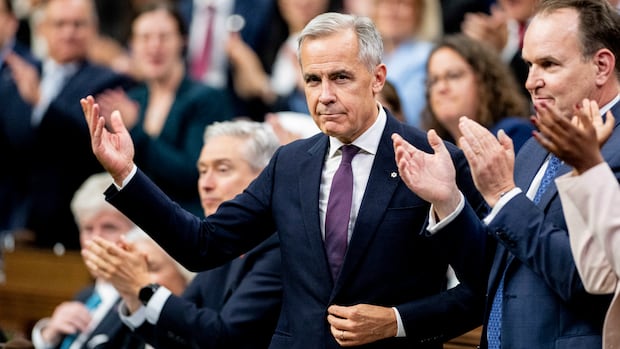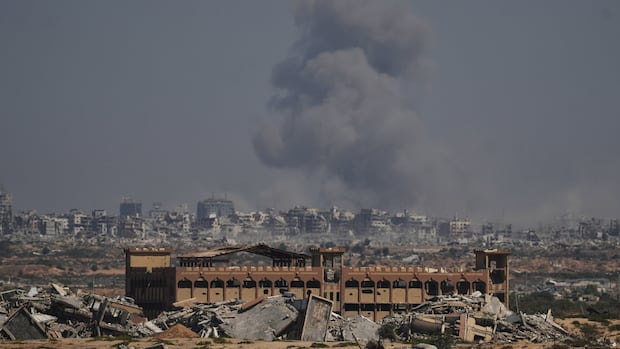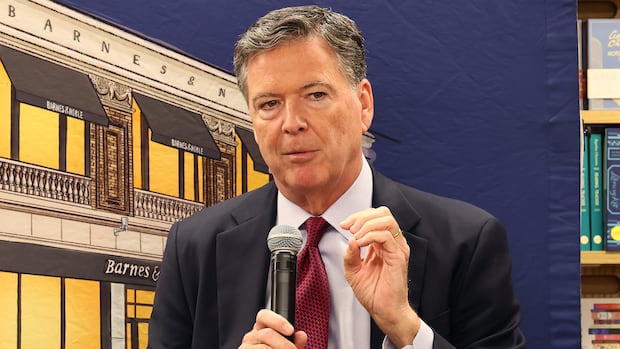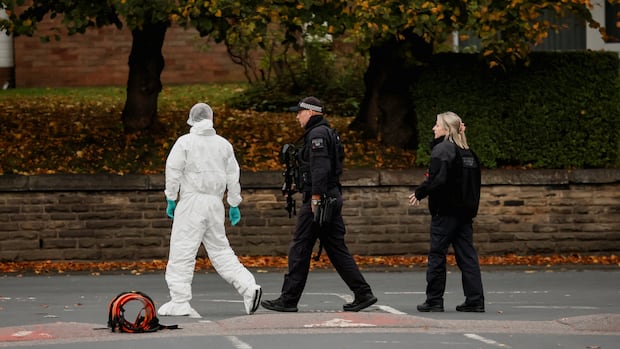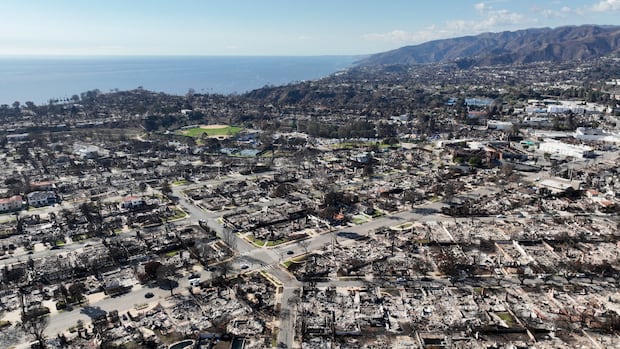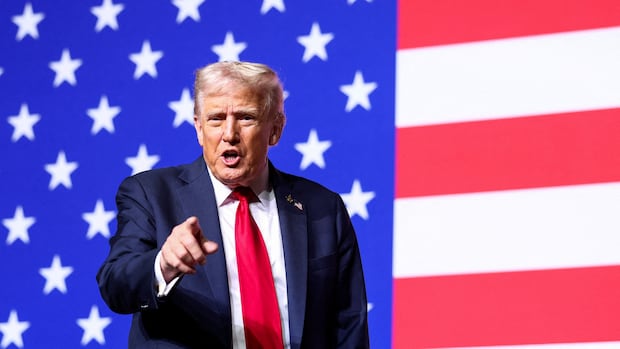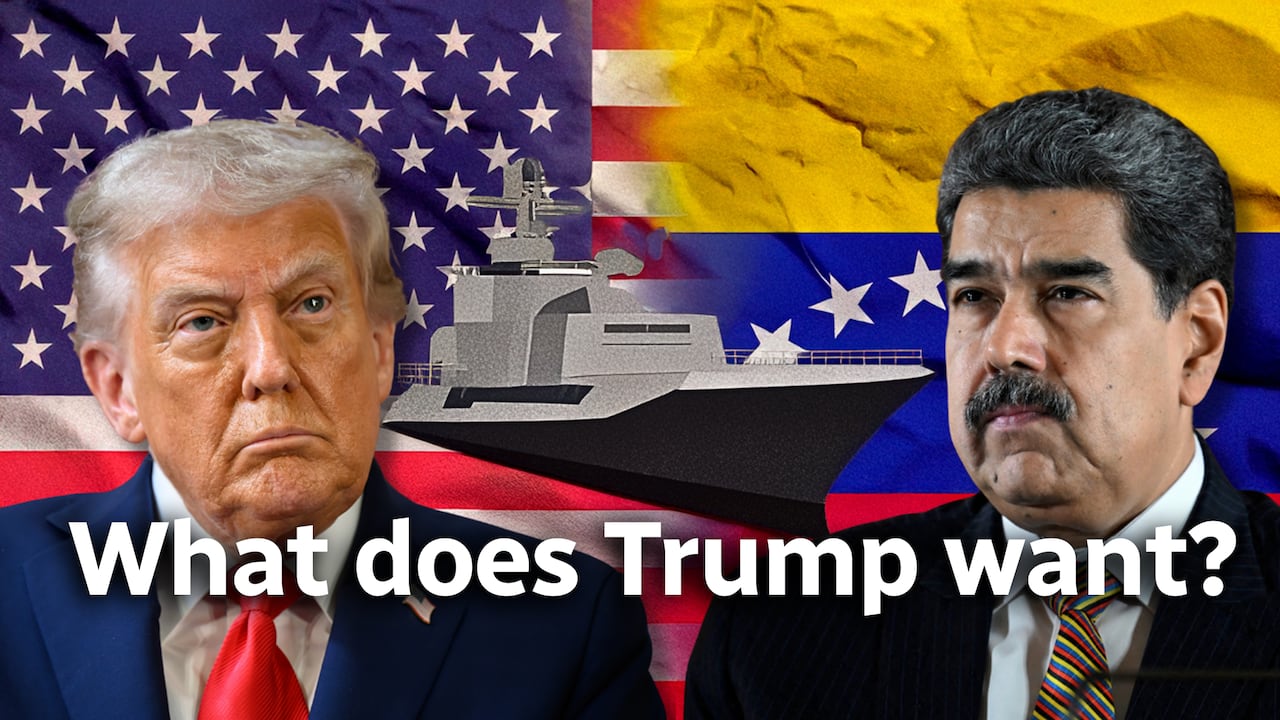Maria Del Carmen Huber Guevara, 63, travelled in a bus with 60 other people all night just to get the chance to see Mexican President Claudia Sheinbaum in person during a rally Sunday in Mexico City.
Huber Guevara said she left her home in Boca del Rio, in the state of Veracruz, at 11 p.m. local time for the 400-kilometre trip northwest to the national capital where she arrived at 6 a.m.
"[She] is the best because she is the first female president and, the truth is, she is working well for us," said Huber Guevara, sitting on a chair in Constitution Square, which was jammed with tens of thousands of Sheinbaum supporters waiting to hear the president speak from a large white stage to mark her first year in office.
The crowds spilled into the adjacent streets beneath the white flags of Sheinbaum's party, the left-populist National Regeneration Movement, known as Morena, which fluttered among blimp-like white balloons.
Huber Guevara said that Sheinbaum's government had finally given her title to her home where she's lived for over 30 years as part of a neighbourhood that grew on squatted land.
"Imagine living in a place for 30 years with nothing to show that you are the owners," she said. "How can you not be grateful?"
 Maria Del Carmen Huber Guevara travelled over 400 kilometres from her home by bus to see Sheinbaum at the rally on Sunday. (Jorge Barrera/CBC)
Maria Del Carmen Huber Guevara travelled over 400 kilometres from her home by bus to see Sheinbaum at the rally on Sunday. (Jorge Barrera/CBC)Sheinbaum, who local polls say has a 70 per cent approval rating, is facing a wide range of challenges, from tensions in the trade relationship with the U.S. to an ongoing domestic public security crisis created by deeply entrenched organized crime groups.
While supporters see her as the type of leader Mexico needs, others see Sheinbaum continuing the creeping dominance of her ruling party over the country's levers of political power.
'For the people'Sheinbaum opened her speech by reinforcing the image she has worked to project as a president of the people.
"I don't walk alone. I don't govern alone. Our government is of the people, for the people and by the people of Mexico," she said.
"We are living a historic moment."
Cosimo Morales Hurtado, 73, a cane farmer from Tlaltetela, Veracruz, said it's true Sheinbaum cared for the poor and for those who made their living from the land.
"Before, the other governments, they diverted money in many ways," said Morales Hurtado.
"She is helping the countryside, the producers of corn, coffee, lemons, cane — that is why we are here, we are thankful."
 Cosimo Morales Hurtado, 73, far left, a cane farmer from Tlaltetela, Veracruz, says Sheinbaum cares for the poor. (Jorge Barrera/CBC)
Cosimo Morales Hurtado, 73, far left, a cane farmer from Tlaltetela, Veracruz, says Sheinbaum cares for the poor. (Jorge Barrera/CBC)Sheinbaum, the former mayor of Mexico City and an energy and climate change scientist, continued Morena's hold over the presidency after she succeeded the previous president, Andrés Manuel López Obrador, the party's founder.
She is now arguably the most powerful president since 2000, when Vicente Fox broke the 70-year hold on the presidency by the Institutional Revolutionary Party (PRI). Morena and its allies currently control Congress, the Senate and the majority of state governorships.
Political analyst Carlos Bravo Regidor, who is based in Mexico City, said the president's popularity is outpacing that of her own government.
Sheinbaum's administration has been marred by allegations of corruption, struggled in the face of a weak economy and, like other governments before, been buffeted by ongoing, cartel-linked violence across large swaths of the country.
 Tens of thousands of people packed into the historic heart of Mexico City for a rally marking the first year of Sheinbaum's term. (Tania Miranda Perez/CBC)
Tens of thousands of people packed into the historic heart of Mexico City for a rally marking the first year of Sheinbaum's term. (Tania Miranda Perez/CBC)"She seems to be vaccinated against the way in which people evaluate the performance of her government," said Bravo Regidor.
"Claudia Sheinbaum has a good image as a professional, as a serious woman…. She has not made big mistakes."
Sheinbaum has been credited with the deft handling of U.S. President Donald Trump's global trade war, which threatened to pull apart the Canada-U.S.-Mexico Agreement (CUMSA) now headed for renegotiation.
During her speech, Sheinbaum said she was "confident" Mexico would reach a trade deal with the U.S. She also took a subtle jab at Trump, saying that a new passenger rail project linking Mexico City to several states should be called the "Gulf of Mexico Train," after asking the crowd if they agreed.
'Pac-Man affect'But after the cheers and music fade and the cleaners stack the chairs and sweep away the remnants of Sunday's rally, Sheinbaum will face serious and intertwined challenges involving the economy, the U.S. and public safety, which will define her remaining five years in office, said Bravo Regidor. In Mexico, presidents are only allowed to hold one, six-year term in office.
"So, [her popularity] might still go south," said Bravo Regidor.
While the government has released recent data it says shows rates falling for what it calls "intentional homicides," like assassinations, organized crime groups still hold control over several states such as Michoacán, Sinaloa and Jalisco.
"There is this phenomenon called criminal governance where it's very hard to tell apart organized crime and authorities," said Bravo Regidor.
During her speech, Sheinbaum promised she's taking a hard line against this type of corruption
"In this new Mexico, honesty is not the exception, it's the rule. Those who betray the people, rob from the people, will face justice," she said.
 Mario Raul Saurez, 68, is part of a fledgling protest group opposing Sheinbaum and the ruling Morena Party. Raul Saurez stands in their protest camp set up in a plaza near the National Palace. (Jorge Barrera/CBC)
Mario Raul Saurez, 68, is part of a fledgling protest group opposing Sheinbaum and the ruling Morena Party. Raul Saurez stands in their protest camp set up in a plaza near the National Palace. (Jorge Barrera/CBC)In a small plaza, along the Metropolitan Cathedral, not far from Constitution Square, a small group of citizens set up a protest camp to mobilize opposition to Sheinbaum and her Morena party. They worked in shifts to keep a constant presence at the camp, with its row of small tents set up behind metal fencing.
"This is the moment for citizens to take action," said Mario Raúl Suarez, 68. "We have to rescue our institutions to preserve our liberty."
Members of the group, which has yet to gain mainstream traction, say they believe Sheinbaum and her Morena party are trying to control all the levels of power through acts like recently enshrining a law requiring that judges be elected and by giving the military control over civilian functions, such as overseeing major public works projects — issues that have sparked controversy in the country.
Most of the nine justices now on the Supreme Court have links to the ruling Morena party.
"It's like a Pac-Man effect. The government is taking control over everything," said Jorge Arriaga Vidalez, one of the group's members.
 Raul Suarez stands inside one of the shelters erected as part of an anti-government protest camp near the National Palace in Mexico City. (Jorge Barrera/CBC)
Raul Suarez stands inside one of the shelters erected as part of an anti-government protest camp near the National Palace in Mexico City. (Jorge Barrera/CBC)The group recently drew direct condemnation from Sheinbaum for chanting "no to dictatorship" over a megaphone, to the rattle of a tambourine, as Prime Minister Mark Carney pulled up in his motorcade in front of the National Palace for a bilateral meeting on Sept. 18.
"If this was a dictatorship, do you think they could be screaming, 'dictatorship,' when there is an international visit? It's a little bit schizophrenic," said Sheinbaum, the next day during her morning news conference.
'A bloody era'During the week leading up to Sunday's rally, thousands marched from the Three Cultures Plaza to Constitution Square on Oct. 2 to commemorate the 1968 Tlatelolco massacre when the Mexican military fired on protesting students.
 Mother's of the dissappeared hold images of their missing loved ones during Thursday's march in Mexico City commerating the Tlatelolco student massacre by the Mexican military in 1968. (Jorge Barrera/CBC)
Mother's of the dissappeared hold images of their missing loved ones during Thursday's march in Mexico City commerating the Tlatelolco student massacre by the Mexican military in 1968. (Jorge Barrera/CBC)Quiquet Pastor Toledo, 86, was there and saw his friends gunned down.
"There were bullets, there were bullets that thundered, that thundered," he said. "Not one by one, but one right after the other."
Pastor Toledo said the fundamental demands from the students from that time — democratic and political reform — had barely been met, 57 years later.
"We have not solved much of what we were calling for. It's changed at the pace of water droplets," he said.
 Quiquet Pastor Toledo, 86, was at the 1968 Tlatelolco massacre and saw his friends gunned down when the Mexican military fired on protesting students. (Jorge Barrera/CBC)
Quiquet Pastor Toledo, 86, was at the 1968 Tlatelolco massacre and saw his friends gunned down when the Mexican military fired on protesting students. (Jorge Barrera/CBC)He said the country is currently convulsed by a level of cartel-fuelled violence beyond anything witnessed in its history.
"You may have noticed that there have been disappearances in Mexico. My beautiful Mexico is in a bloody era, from the north to the south, from the east to the west, that was not experienced in times past," said Pastor Toledo.
"Mexico … even as it is now, has so much potential to move forward and I love it."


